
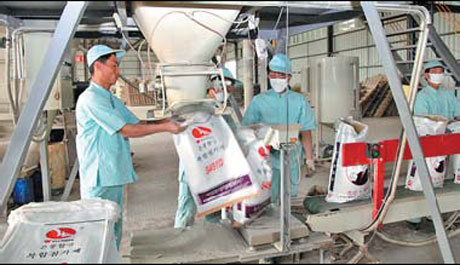 |
| A feed joint venture between China and the Democratic People's Republic of Korea in Pyongyang. Zhang Li / Xinhua |
Business with DPRK 'operating as usual' despite international dispute
Last week's nuclear test by the Democratic People's Republic of Korea has had little effect on its trade with China, but the two new DPRK economic zones may suffer, analysts warned on Monday.
Trade between China and the DPRK has not changed much since Pyongyang's nuclear test on Feb 12, which has drawn criticism worldwide.
Qian Yingchun, general manager at Tongyi Co in Dandong, Liaoning province, said trade with the DPRK has been "operating as usual" since the test.
"Most trading business with the DPRK in our city is small-scale, which is influenced slightly by the dispute at the international level," Qian said.
Tongyi is a trading company that has exported Chinese construction materials, metals, general merchandise and furniture to the DPRK for more than 15 years.
The cross-border trade in the frontier city of Dandong alone accounts for more than 80 percent of Sino-DPRK trade.
"Even if our trading goods are suspended due to the current situation, it will be short term, and customs formalities will return to normal a few days later," Qian said.
China is the DPRK's largest trading partner. Excluding a dip in 2009, trade has increased every year since 2000, reaching $5.67 billion in 2011, a rise of 62.4 percent year-on-year, according to the General Administration of Customs.
China's major imports include coal, ores, woven apparel, fish and seafood, while exports include electrical machinery, vehicles and iron and steel. China is also a major source for the DPRK's petroleum.
The two countries in 2010 established the Rason Economic and Trade Zone in the DPRK port of Rason on that country's east coast near China's Jilin province, and the Hwanggumphyong and Wihwa Islands Economic Zone, in the west at Hwanggumpyong and the Wihwa islands near Dandong, aiming to boost bilateral trade and investment cooperation.
But Sang Baichuan, director of the Institute of International Business at the University of International Business and Economics in Beijing, said the nuclear test already "has had a major effect on trade relations, and efforts to further advance the two economic zones have been suspended". He did not give the source of the information.
Huo Jianguo, president of the Chinese Academy of International Trade and Economic Cooperation, a think tank affiliated with the Commerce Ministry, said that to what degree bilateral trade and economic relations will be affected still depends on how the situation develops.

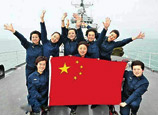
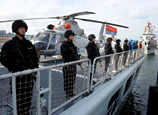


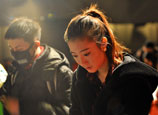
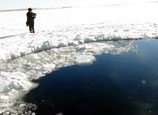
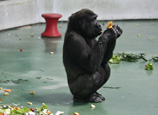
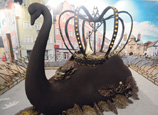

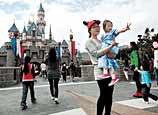






 Auto-chat app sparks social skills concern: A littile yellow chicken can talk, really?
Auto-chat app sparks social skills concern: A littile yellow chicken can talk, really?


![]()
